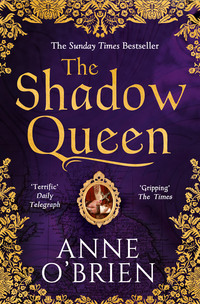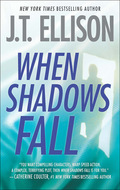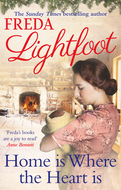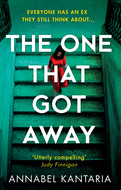Kitap dosya olarak indirilemez ancak uygulamamız üzerinden veya online olarak web sitemizden okunabilir.
Kitabı oku: «The Shadow Queen»
Praise for Anne O’Brien
‘O’Brien cleverly intertwines the personal and political in this enjoyable, gripping tale’
The Times
‘[A] fast-paced historical novel’
Good Housekeeping
‘Anne O’Brien has unearthed a gem of a subject’
Daily Telegraph
‘A gripping story of love, heartache and political intrigue’
Woman & Home
‘There are historical novels and then there are the works of Anne O’Brien – and this is another hit’
The Sun
‘The characters are larger than life…and the author a compulsive storyteller’
Sunday Express
‘This book has everything – royalty, scandal, fascinating historical politics’
Cosmopolitan
‘A gripping historical drama’
Bella
‘Historical fiction at its best’
Candis
Also by ANNE O’BRIEN

Copyright

An imprint of HarperCollins Publishers Ltd
1 London Bridge Street
London SE1 9GF
First published in Great Britain by HQ in 2017
Copyright © Anne O’Brien 2017
Anne O’Brien asserts the moral right to be identified as the author of this work.
A catalogue record for this book is available from the British Library.
This novel is entirely a work of fiction. The names, characters and incidents portrayed in it are the work of the author’s imagination. Any resemblance to actual persons, living or dead, events or localities is entirely coincidental.
All rights reserved under International and Pan-American Copyright Conventions. By payment of the required fees, you have been granted the non-exclusive, non-transferable right to access and read the text of this e-book on-screen. No part of this text may be reproduced, transmitted, down-loaded, decompiled, reverse engineered, or stored in or introduced into any information storage and retrieval system, in any form or by any means, whether electronic or mechanical, now known or hereinafter invented, without the express written permission of HarperCollins.
Ebook Edition © May 2017 ISBN: 9781474050739
Version: 2019-04-12
For George, as ever, my love and my thanks for his cheerful tolerance of all things medieval. His appreciation of Joan of Kent’s wayward lifestyle was often more balanced than mine. The Fair Maid owes him a debt of gratitude too.


‘…the most beautiful lady in the whole realm of England, and by far the most amorous.’
Jean Froissart
‘…concerning whose birth (Richard II) many unsavoury things were commonly said (of her), namely that he was not born to a father of the royal line, but of a mother given to slippery ways – to say nothing of many other things I have heard.’
The Chronicle of Adam Usk 1377-1421
‘The gentle prince married… a lady of great renown, who kindled love in him, in that she was beauteous, charming and discreet.’
Chandos Herald
‘Prudence teaches the princess or great lady how above all things in this base world she ought to love honour and good reputation.’
Christine de Pisan
Contents
Cover
Praise
Also by Anne O’Brien
Title Page
Copyright
Dedication
Prologue
Chapter One
Chapter Two
Chapter Three
Chapter Four
Chapter Five
Chapter Six
Chapter Seven
Chapter Eight
Chapter Nine
Chapter Ten
Chapter Eleven
Chapter Twelve
Chapter Thirteen
Chapter Fourteen
Chapter Fifteen
Chapter Sixteen
Chapter Seventeen
Chapter Eighteen
Extract
Acknowledgements
What inspired me to write about Joan of Kent?
In the steps of Joan of Kent
And Afterwards:
Epitaph of Edward of Woodstock, Prince of Wales
About the Publisher
Prologue
I stared at the reflection, with appreciation. The eyes – bold, self-assured – stared back at me.
To mark the celebration of the day of my birth – I do not recall which year it might have been except that I was still little more than a child – I was given this mirror by Philippa. Queen Philippa, my cousin by marriage, wife of my royal cousin King Edward the Third. I think that I had no gift from my mother on that occasion. My mother had mislaid the celebration amidst all the other burdens on her memory. As for my father, he was dead by an axe reserved for those condemned for treason. But Queen Philippa remembered and marked the day. I valued that mirror highly.
‘Don’t look in it too often, Joan,’ Philippa advised in her kindly manner, when she saw me glance in its silvered surface for the third time within the reading of our daily prayers. ‘It will set your pretty feet on the path to vanity and self-will, neither of which are admirable qualities in a young woman.’
It was a beautiful thing, the glass embellished by an ivory mount, the back smooth-carved with two figures of a knight and his lady. She was crowning him with a garland to symbolise their love. The mirror was made to hang from a cunning little hasp at my belt.
Lifting it, now that I was alone and at leisure to do so, I angled it towards the light and studied the face that looked back.
Fair hair, as fair as that of the Blessed Virgin in my Book of Hours, was pleated and pinned and tucked beneath a coif in seemly fashion, so that there was little to see of it, but I knew it was much admired by the women who cared for me. Pale skin without blemish or unsightly freckle. A straight nose. Brows darker than my hair, arching impressively with a touch of female artifice. Eyes that were agate-dark, with lashes that were the envy of my female cousins. A graceful neck. Which was as much as I could see in the small aperture, but it was enough. I enjoyed the experience.
I was Joan of Kent. Joan the Fair. Even now my praises were being sung where men admired female loveliness.
‘And in the taverns too, I don’t doubt.’ My cousin Princess Isabella had a caustic tongue. ‘I would not be proud of that.’
‘But then, dearest cousin, you can lay no claim to my degree of beauty. Although,’ I adopted a nice tone of condescension, ‘the ground lily root with egg yolk has been miraculous in ridding your skin of blemishes.’
Isabella, pretty enough, glowered.
Beware conceit, Queen Philippa would admonish. Her beauty was neither in her face nor her figure, rather in her loving heart, but I was too young to acknowledge that allure of the flesh could be of less value than winsomeness of the spirit. How could I not be vain when I had been so gracefully blessed in face and form?
What would the future hold for me?
Whatever I wished it to hold, of course. Was I not of royal blood? I tilted my chin, liking the result as the light glimmered along the fine line of my brow, softening my perfect cheekbones. I must practise looking imperious. I was sure that it would be a most useful attribute.
Chapter One
Late Autumn, 1340: Windsor Castle
A servant, opening the door with well-worn deference, bowed briefly and generally to the crowded chamber. For the most part, inured to such interruptions and intent on our own pursuits, we, the youthful but high-bred occupants, ignored him. There was music, there were books and counter games. There were small animals to be teased and cosseted. The boys were clustered round a longbow in need of repair. We, my sister and female cousins, were draping a length of luridly-vermillion embroidered cloth, discovered in one of the King’s Twelfth Night dressing-up coffers, around the short figure of Princess Isabella.
The servant cleared his throat, to no avail.
Who were we, to ignore what would be a summons from some higher authority for at least one of us? We, as we were all supremely well aware, were of the highest blood in the land.
Here in my company, or I in theirs if rank was of supreme importance rather than age, were the royal daughters of King Edward the Third and Queen Philippa, the princesses Isabella and Joan. There, his head bent over a harness, working with ferocious attention at a detached buckle, was William Montagu, heir to the Earl of Salisbury who was at this moment prisoner in France, captured during the French wars. The vivid, dark-haired lad with the bow in his hand, reattaching the bowstring with some skill, was Edward of Woodstock, the heir to the throne, who should have been engaged with the Master at Arms in polishing his military skills but had escaped to talk battles and horses with William Montagu and my brother John, Earl of Kent, for all his youth. And then there was Lionel, another prince of the King and Queen’s growing family, still barely two years and under the close eye of his nurse as he staggered on unsteady legs after his magnificent brother.
The servant, undeterred by our lack of response – for which Queen Philippa would have taken us to task, for nothing excused ill manners in her book of how royal children should be raised – allowed his eye to discover and rest on me. I was sitting on the floor, passing pins to my elder sister Margaret with instructions on how to fit the damask bodice as becomingly as possible to Isabella’s flat chest.
The servant loomed over me. I looked up.
‘A message for you, Mistress Joan. Your lady mother, the Countess of Kent, has arrived. She wishes to see you. If you will present yourself at her chamber.’ When I did not stir, other than to hand another pin to sister Margaret, he added. ‘Now, mistress, not some time at your convenience. It might be best.’
So my mother was at Windsor, and it was implied, by being graced by her full title rather than the simpler Lady Margaret, in a hasty mood. My mother travelled often, so much so that I rarely saw her. So why had I been summoned, selected out of her three offspring? No, it would not be politic to waste time. My mother had a temper born out of disappointment and past humiliations brought on by an absent and horribly dead husband.
So I stood, pushing the pot of pins into Margaret’s hands. Spurred by curiosity, Isabella detached herself and, trailing velvet damask, accompanied me to the door, pulling at my sleeve when I did not moderate my step.
‘What do you suppose she wants?’ Isabella, four years younger than I, was considered precocious for her age. ‘Have you committed some sin? If you have, I don’t know about it.’ Her eyes gleamed with the prospect of some conspiracy. ‘Tell me!’
I had no intention of telling Isabella, an inveterate gossip, anything at all.
‘I will soon know,’ I said.
I looked down at my side-less surcoat, pulling it and the sleeves of my undergown into order. I had not dressed with any care that morning, nor had sitting on the floor improved my skirts that were now creased. My mother had an eye for appearances and she was not tolerant. If it was a matter of sin, better not to earn her displeasure before she took issue with me.
‘Let me.’ Accepting my brusqueness as normal in the circumstances, Isabella stretched up and straightened my coif, tucked my hair almost out of sight before picking the evidence of fur from the small grey cat from my bodice. ‘That’s better, although red does not become you.’
‘Better than vermillion becomes you, cousin.’ I became aware that she was looking at me, lips pursed in thought. ‘What?’
‘Did you go to Mass this morning?’
‘No.’ She knew very well that I had not.
‘Then this might be useful.’
Shrugging aside the damask so that it fell in a heap to the floor, from her bodice Isabella unpinned a jewelled reliquary, far too fine for so young a girl to be wearing but Isabella had insisted. It was hers to wear, given at her birth by an indulgent father who saw no wrong in his wayward daughter. It contained, as we all knew since repeated frequently to impress, the tears of the Blessed Virgin herself.
Isabella’s bright face was lit with intrigue.
‘I think you should wear this.’
‘I am honoured.’
And I was. Isabella did not give possessions willingly. She transferred it from her bodice to mine, where the gold glittered impressively as I moved.
‘But why would I need a symbol of such power?’ I asked.
‘It will keep you safe from sin.’
‘I have committed no sin.’
‘No, but your lady mother might think that you have.’ She might indeed. I kissed Isabella’s cheek.
‘But take good care of it,’ she admonished. ‘I want it back when this interview is over.’
‘Quickly if you will, mistress.’ The servant, breathing heavily, was still waiting in the doorway.
Following the servant to my mother’s distant chamber, I still found the opportunity to linger on the way. I disliked being beckoned in such a manner when she had not seen me for more months than I could recall. She would not have demanded my brother’s presence so forcefully, but then, to her mind, sons were of far greater value than daughters.
I stopped by a window, to press my cheek against the cold glass, a luxury on which the King had just spent a fortune in an attempt to ward off the draughts. Since my veils fluttered a little, it had not been a great success.
‘Mistress!’
‘I am coming!’
I entered her chamber to curtsey with practised precision and innate grace, but if I had intended to make a good impression, I failed.
‘Joan. At last.’
My mother. Margaret, Lady Wake, Lady of Badenoch, Dowager Countess of Kent.
Tall and spare, my mother gave off the air of a determinedly held widowhood. Her close-fitting gown was rich but sombre in layers of grey and black and the deep purple of autumn blackberries. Her veil was richly embroidered but not one curl of hair was allowed to show beneath the wimple that she still embraced despite the dictates of fashion. Her face was long, the skin finely grained, but there was no evidence of any humour or pleasure in her existence. Indeed, her stark solemnity with its close folding of her lips was intimidating, as was the heavy musk of her perfume as the satin of her skirts rustled into stillness. She looked older than her years. She had barely more than forty to her lifespan.
‘I expected you a half hour ago.’
An exaggeration, of course. My mother did not touch me. The Queen, who had absorbed me into the royal nursery when I was no more than two years old and had supervised my upbringing ever since, would have folded me into her arms after such a lengthy absence. Queen Philippa would have smiled at me.
‘I came as quickly as I could, madam. I was reading with the princesses.’ The lie came easily, slipping off my tongue. I had lied before. ‘Our tutor wished us to have knowledge of the life of St. Ursula who is the patron saint of young virgins, such as we are. We will be celebrating her Feast Day on the twenty-first day of October with a masque before the court. We were commended on our reading.’
My mother had not led the easiest of lives. Some would say a life full of degradation. Perhaps she deserved my pity; when a woman’s husband was executed for treason, and that in disgraceful circumstances, and she within weeks of producing a child and under arrest for her husband’s sins, she will not feel blessed. And then there was the resulting loss of lands and titles and pre-eminence as a consequence of that husband being declared traitor. My mother had lived under suspicion because she had set her own hand to some of the treasonous letters.
But that was all in the past. Since a royal pardon had drained away a portion of her guilt but not all of her bitterness, my mother had dedicated her life to the reinstatement of her family. A laudable objective, but sometimes I found it difficult to experience any emotion but resentment.
As now.
‘That is good. I approve of St. Ursula,’ she said, still seated in the high-backed chair beside the window where the light fell on her unflattering hair-confinement. ‘I hope that you are a credit to the Queen and to your governors. Do you take heed of all your lessons?’
‘Yes, madam.’
‘Do you observe your daily prayers? Do you attend Mass?’ ‘Yes, madam.’
Standing now, she approached, to walk in a circle around me, before stopping to lift my chin with her fingers. I was not sure that she believed me, but her reply was complimentary.
‘Then you are everything I had hoped for in a daughter.’
Released, abruptly, I lowered my eyes.
‘I hope so, madam.’
‘A beautiful girl, well nurtured, without sin.’
‘I make confession, madam.’
I prayed, aware of the weight of Isabella’s powerful reliquary against my breast, that my mother could see no colour of culpability in my cheeks. It seemed, from the faintest of smiles that was bestowed on me, that she could not. But then the smile vanished.
‘I trust that your behaviour is decorous and seemly when at court, when you are in the company of the King’s young knights. I do not wish it to come to my attention that you are of a flirtatious disposition, Joan.’
‘My deportment is exemplary, madam. Queen Philippa commends me on it as an example to her own daughters.’ My reply was supremely colourless.
‘So I have heard.’ The Countess returned to her chair, seating herself in a billow of silk, before pinning me with a direct stare. She breathed in, her nose narrowing as it did when she was displeased. ‘I can rest assured that you have been well chaperoned.’ She considered me, the soft pads of the fingers of her right hand tapping against the Book of Hours that she had picked up and now rested on her lap. ‘It is, I think, time.’
When I remained silent under her regard, my mother stopped tapping but instead curled her hands around the fierce animals, carved with open mouths and sharp teeth along the arms of her chair.
‘A marriage has been arranged for you,’ she announced. ‘Your hand has been sought by the most pre-eminent of families.’
There it was, declaimed without warning or fanfare, the announcement I had feared, even though I had always known that in the making of alliances, daughters were of inestimable value. Margaret and I would be expected to marry well, but this was the moment I had been dreading. I swallowed soundlessly, gaze still lowered to the hem of her gown, while the Countess took my silence for demure acceptance.
‘I see it is no surprise to you.’
Obviously my dissembling was sufficient, but it was a surprise. Given my young age I had not expected it to be quite yet, accepting that such plans would be postponed for at least another year, perhaps two. And that it would be a lengthy betrothal rather than a marriage. My sister Margaret, older than I by one year, was betrothed to an important Gascon nobleman, Amanieu d’Albret, a man she had yet to meet. There was no talk yet of their actual marriage on the near horizon.
Oblivious to the thud of my heart beneath the Virgin’s Tears, my mother was continuing. ‘You must have known well what was planned. The King wishes to reward his closest friend, the Earl of Salisbury, sadly still under French restraint and likely to remain there until a ransom is paid. What better way to show royal gratitude for Salisbury’s service to the Crown at home and overseas than for the King to give the hand of his cousin, a Plantagenet princess in her own right, to the Earl’s son.’
So I was to wed Will Montagu, the boy with the harness. I could think of nothing to say.
‘Does it not please you?’ The edge in the Dowager Countess’s voice was emerging as the silence played out.
What could I say that would not cause an eruption of temper?
‘Yes, madam. It pleases me.’
It was the only possible reply.
‘It will be an exceptional alliance. The King and Queen are in full agreement. As for the Salisbury boy, you know him well. You have been raised with him. There will be nothing for you to dislike in the match.’
‘No, madam.’ I decided that I must say something else to deflect the flare of impatience. ‘I like William well enough.’
She nodded. ‘You are much of an age. You will wed, but of course you will continue to live as you do now, until you are both deemed old enough to take on the responsibilities of marriage in the flesh.’
I kept my face expressionless, my eyes abandoning the hem to focus on the toes of my mother’s shoes, expensively gilded.
‘In the absence of the Earl, we will meet with the Countess of Salisbury this afternoon when we will sign the contracts of marriage.’ At last she managed a smile that was more than a bleak movement of her lips. ‘Your father would have approved, Joan. I have carried out this negotiation exactly as he would have wished.’ She looked at me. I could feel those eyes searching my face. Her fingers, relaxed in satisfaction, now clenched. ‘Have you still nothing to say?’
No, I had not. Nothing to the point. Nothing that would not shake the ground beneath her feet. And beneath mine. My thoughts tumbled over each other, searching to find something appropriate, and failing.
‘Thank you, madam.’
My mother sighed as she deigned to explain further.
‘William will be a worthy husband. An alliance with the Earl of Salisbury will be nothing but advantageous for our family. It will be a final mending of our reputation.’
I was not aware that it was broken beyond repair. Did the Queen not love me as much as she loved her own daughters? But treason could cast a long shadow, and my mother had had her own unfortunate role in it. There was much that needed to be healed. Yes, perhaps my mother did deserve my pity and my compliance.
‘Yes, madam.’
‘And you will make a good wife.’
‘Yes, madam.’
‘Tell your women to dress you as befitting a royal audience. I will fetch you when it is time.’
‘Yes, madam.’
‘Now you may go. Perhaps you can summon some expressions of gratitude and delight at the marriage before I see you again.’
‘Yes, madam. I will.’
At last I got to the door, and outside it, with nausea churning in the pit of my stomach. My mother hoped that I would be instrumental in stripping aside our family’s disgrace to finally heal the wounds of the past.
She was doomed to disappointment.
I knew full well what would be my own doom. Many would say that I had brought it on my own head.
I stood outside the door, leaned back so that the wall was cold against my back, and took a breath as I willed the initial panic to subside. Until, that is, I saw in the shadow of a pillar at the far end of the chamber three figures in descending height: William Montagu of Salisbury, Edward the princely heir and my brother John, all of whom had followed me to discover the need for such a summons. They were clearly waiting for me because as soon as I appeared they began to cover the ground between us. Pushing myself upright, with what I considered to be an innocent expression I walked slowly towards them, arranging my thoughts into what I might and might not say.
‘What did she want?’ John demanded without ceremony.
‘Nothing for your little ears, brother,’ I said, but my eyes were on the scion of the House of Salisbury.
Did William know the subject of my interview? Had he already been informed that I would join my hand with his in Holy Matrimony? It might well be. Not a word had passed his lips, but William was perfectly capable of keeping his own counsel. I regarded him through my lashes. Here, at our parent’s planning, and that of the King and Queen, was my future husband, and since I had not been sworn to secrecy, perhaps it would be a good time for me to comment on the fact that we were destined, by forces beyond our control, to spend our future life together.
Except that sharp fear gripped my throat so that I could not force the words into being.
But William could. He pushed John aside.
‘Have you told your mother the truth?’
My eyes narrowed.
‘And you need not lie to me,’ he continued. ‘I know all about it. I have friends in low places. What possessed you, Joan? Had you no sense?’
Which censure soon restored my voice.
‘Have you been listening at doors, Will?’
‘Yes.’
‘Which doors?’ Edward, ignorant of what was passing between us and immediately interested, his eyes were travelling speculatively between William and me. John, interest lost, had climbed onto a window seat where he sat like a crouching gargoyle, hugging his knees.
William nudged Edward, ignored him.
‘You have to say,’ he ordered me. ‘You have to tell her.’
‘I know.’
‘If you don’t, I will.’
Of course I must tell the truth. But when I decided, not at the prompting of my betrothed. For a moment I imagined his standing foursquare between our respective mothers, announcing what I had done. I imagined the combined fury of two irate women raining down upon my head.
I took a rapid step: I seized Will’s arm. ‘You would not dare!’
But William shook me off, in no manner intimidated. ‘Not dare? Of course I dare. If I do not, what sort of a fool will I look, when all is discovered? And discovered it must be.’
William could be formidable when he chose, even though our gaze was on a level.
‘Shh!’ I hissed. His voice had risen in pitch, to echo through the antechamber.
‘Tell them Joan, or I will.’
‘Tell them what?’ Edward would not be deflected a second time.
‘Be quiet, Ned! You are too young to know anything about it,’ I said.
‘Only because you won’t tell me,’ he replied with superb logic. He stopped fidgeting from one foot to another and for a moment looked like a royal prince and with all the pride of his Plantagenet heritage. ‘You must tell me. I insist.’
‘If Joan confesses,’ William said, ‘then all can be put right and there’ll be nothing to tell.’
‘I will tell my mother,’ I said, back on my dignity, except for the evidence of my fingers tightening once again on his forearm, making him wince. ‘How do you know?’
‘A page. A terrified rat who fell over me in his hurry to pack up his lord’s armour when we were in Ghent. I picked him up. He was shockingly talkative. Until his mouth clammed shut like a wolf-trap.’
A flutter of rising panic unnerved me. Of course, William had been with us in Ghent. ‘Did the page tell anyone else?’
‘How would I know?’
All I could do was pray that he had not. I released Will’s arm. ‘You must promise me you’ll not say a word.’
Unimpressed, William strode off with the final sally: ‘I promise nothing!’, leaving Edward regarding me with what could only be described as haughty demeanour.
‘You should not allow Will to talk to you in that manner.’
‘I know.’
‘You are of royal blood. You are my cousin.’
My thoughts were elsewhere. ‘The King is my cousin, not you.’
Ned’s brows climbed, his reply was curt. ‘As near as makes no difference. You are my family. You must tell me if Will does not show you the respect due to you.’
‘Oh, I will.’
And then the arrogance was gone, leaving only a young man growing into his strength and impeccable rank. ‘I’ll be kind to you, Jeanette.’
‘I know you will.’
I patted his shoulder. He might be the only one who was kind when all was revealed.
I walked with him back to the Painted Chamber, brother John running ahead to catch up with William who might prove to be better company, Edward fast forgetting his irritation and making practice sweeps with the new sword, a gift from his father and from which he was inseparable. When we arrived, to my relief, William was not there, nor was my sister, but Isabella was and must have read some emotion in my face for she gathered me into her arms in a quick embrace, stroking her fingers over the amulet at the same time as she ordered her brother to go away. Which he did with a stern nod of his head and a distinct swagger.
‘Did it work? Did the Blessed Virgin fill you with grace?’
I shook my head. ‘Not noticeably. I think I would like to keep it,’ I suggested. ‘Until supper. If you would allow.’
I thought I would need the continued offices of the Blessed Virgin Mary before this day was out. Before I could answer any more questions, I was swept up by my women. They had work to do on my person if my mother was to be satisfied. They would not let me out of their sight until I was groomed and polished like Ned’s new warhorse.
Who were we, this royal but troubled family? Who was I, to be raised in a royal nursery, yet to be used by my mother to rebuild our future security, to repair a damaged reputation?
There was no question about my royal blood. My dead father was Edmund, Earl of Kent, son of King Edward the First by his second wife, which made him half-brother to the previous ill-fated King Edward the Second, and uncle to the present King Edward the Third. There was no question about my impeccable lineage. As I had reminded Ned, I was first cousin to the King.
My mother Margaret, Lady Wake, was of a lesser rank. A young widow, her hand in marriage had been sought by my father, a marriage that had been frowned on by his royal brother. My mother came from good stock, but one which was neither wealthy nor influential in the politics of the day; she was not the woman King Edward the Second would have chosen for his brother. Notwithstanding, my parents married for love, were ultimately accepted back into the royal fold and produced four children in as many years, of whom I was one. Why would they not enjoy a life at the royal court, under the patronage of the King?








